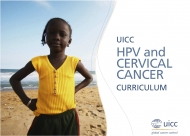Cases of certain HPV strains have plunged 56 percent among females 14 years old to 19 years old since the first vaccine, Merck & Co. (MRK)’s Gardasil, was introduced in 2006, according to an article yesterday in the Journal of Infectious Diseases. The shot is 82 percent effective against the virus that can cause cervical cancer if at least one of the three doses is given.
 “These are striking results and they should be a wake-up call that we need to increase vaccinations,” Thomas Frieden, director of the Centers for Disease Control and Prevention, told reporters on a conference call. “It is possible to protect a generation from cancer and we have to do it.”
“These are striking results and they should be a wake-up call that we need to increase vaccinations,” Thomas Frieden, director of the Centers for Disease Control and Prevention, told reporters on a conference call. “It is possible to protect a generation from cancer and we have to do it.”
A vaccine for human papillomavirus, a sexually transmitted infection that can cause cervical cancer, is proving so successful that the top U.S. disease specialist is pushing to inoculate an entire generation of teenage girls.
Vaccination rates have been low, with about 34 percent of females ages 14 to 19 saying they received at least one dose in the 2007-2010 period, the report shows. Gardasil sparked debate in 2007 as states tried to mandate HPV shots for schoolgirls, even with a lack of long-term safety studies. Researchers are also trying to combat perceptions about sexual promiscuity.
“Some parents have the concern that giving them the human papillomavirus vaccine is giving them permission to have sex,” Dennis Cunningham, an infectious disease pediatrician at Nationwide Children’s Hospital in Columbus, Ohio, said in an interview. “It’s amazing. Seventy percent of cervical cancer could be eliminated if more people had the vaccine.”
Four Strains
HPV is the main cause of cervical cancer, with about 12,000 women in the U.S. getting the disease, and almost 4,000 of those dying each year, according to the CDC. The vaccine targets teenagers because it needs to be given before a person becomes sexually active to prevent cervical cancer as an adult.
The report yesterday showed that the 56 percent drop in the strains of HPV covered by the vaccine from 2003-2006 to 2007-2010 was greater than expected. The prevalence of certain strains of HPV dropped to about 5 percent in 2007-2010 from about 12 percent in 2003-2006, according to the article.
Merck’s Gardasil protects against four strains of the virus linked to genital warts and cervical cancer. The vaccine generated more than $1.6 billion in 2012 sales for Whitehouse Station, New Jersey-based Merck, the company reported.
GlaxoSmithKline Plc (GSK)’s Cervarix, approved by the U.S. Food and Drug Administration in 2009, had about $428 million in 2012 sales, according to data compiled by Bloomberg.
Safety Concern
Unlike most vaccines, the HPV inoculation isn’t required for school enrollment and it needs three shots, meaning parents would have to take their child to the doctor multiple times.
Parents increasingly intend not to vaccinate their daughters and concerns about safety have grown, according to a study this year in Pediatrics. The intent not to vaccinate for HPV jumped to almost 45 percent in 2010, from almost 40 percent in 2008.
Clinical trials and post-licensing monitoring data show the two vaccines available are safe, according to the CDC.
The new research may allay parents’ concerns about the vaccine, Amanda Dempsey, associate professor of pediatrics at the University of Colorado Denver, said in an interview.
“They think their child isn’t sexually active or isn’t likely to be in the future, which is unfortunate,” Dempsey said. “Media stories about safety concerns are also one reason. There are still safety concerns among parents.”
Oral Sex
The HPV vaccine was introduced into the routine immunization schedule in late 2006 for 11-year-old or 12-year-old girls, with catch-up vaccinations recommended for those 13 to 26. In 2010, three-dose vaccination coverage was 32 percent among those 13 to 17.
A total of 4,150 females in 2003-2006 and 4,253 females in 2007-2010 ages 14 to 59 were included in the analysis.
Some countries have made the HPV vaccines available for boys as well. In the U.S., where two-thirds of U.S. teenagers and young adults say they have had oral sex, the shots are recommended for boys ages 11 and 12.
To contact the reporter on this story: Stephanie Armour in Washington at sarmour@bloomberg.net
To contact the editor responsible for this story: Reg Gale at rgale5@bloomberg.net
https://www.businessweek.com/news/2013-06-19/cancer-causing-sex-virus-shown-reduced-in-teen-girls-by-vaccines
- Red de Institutos Nacionales de Cancer de Latinoamérica RINC-ALC - 26th June 2019
- Pioneers in Infectious Agents and Cancer Meeting - 2nd March 2017
- IARC 50th Anniversary Meeting 2016 - 13th June 2016
Comments